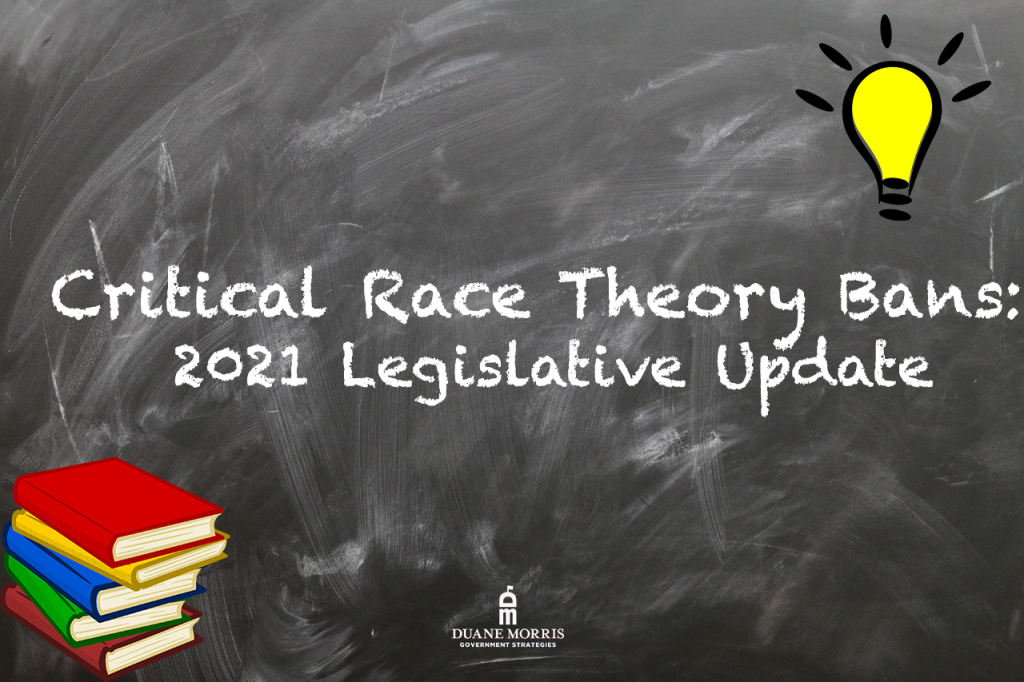
In an attempt to suppress the teaching of critical race theory and other racial and legal concepts, many states have passed or are considering legislation banning teachers’ from discussing aspects of race, justice, history, and the American legal system. Critical race theory, or CRT, is an academic legal framework that examines how racial biases are embedded in institutions, government policies, and the criminal justice system. Additionally, the theory hypothesizes that these implicit biases in policymaking, including societal institutions like education, healthcare, and labor markets, can create disproportionate outcomes among different racial groups.
Political opponents to the theory assert that it urges division, teaching individuals to think in terms of their group identity and separating people into categories of “oppressed” and “oppressor.” As of July, 26 states have taken steps to restrict teachers from discussing CRT. At the national level, legislation was introduced to cut federal funding from public schools that teach lessons based on The New York Times’ 1619 Project. As will be examined below, 12 states have signed bills into law or taken other state-level action that will restrict the teaching of critical race theory or other “divisive concepts.”
Arizona Race Discussion Legislation Signed by Governor
On June 30, 2021, Arizona Governor Doug Ducey signed HB 2898 into law. The bill, HB 2898, bans teachers from teaching coursework that includes the following concepts: 1) one race or ethnic group is inherently superior to another race, 2) an individual, by virtue of his or her race, is inherently racist or oppressive, 3) an individual should invidiously receive adverse treatment solely or partly due to his or her race, 4) an individual’s moral character is determined by his or her race, ethnicity, or sex, 5) an individual bears responsibility for the past actions committed by another person of the same race, 6) an individual should feel anger or discomfort because of his or her race, ethnicity, or sex, and 7) academic achievement, meritocracy, and traits like hard work are racist.
Additionally, if educators violate the bill’s bans, “the court may impose a civil penalty not to exceed $5,000 per school district, charter school or state agency where the violation occurs.” The house bill passed the State House and Senate 31 yeas to 29 nays and 16 yeas to 12 nays with two “no votes,” respectively.
Florida and Georgia State Boards of Education
In June, Florida’s governor-appointed state board of education voted to approve a rule banning schools from teaching critical race theory and the 1619 Project. According to the state board of education, “Examples of theories that distort historical events and are inconsistent with State Board approved standards include the denial or minimization of the Holocaust, and the teaching of Critical Race Theory, meaning the theory that racism is not merely the product of prejudice, but that racism is embedded in American society and its legal systems to uphold the supremacy of white persons. Instruction may not utilize material from the 1619 Project and may not define American history as something other than the creation of a new nation based largely on universal principles stated in the Declaration of Independence.”
In Georgia, the governor-appointed state board of education adopted a resolution that first states, “the United States of America is not a racist country, and that the state of Georgia is not a racist state.” Additionally, the resolution is against lessons that “indoctrinate” students or promote the idea that one race or sex is above another. The resolution also opposes awarding credit for student service-learning with advocacy groups. However, this resolution has not been codified into rules.
Idaho Bans Teaching of Critical Race Theory
Signed by Governor Brad Little on April 28, 2021, HB 377 states that education intends to respect the dignity of others, acknowledge the right of others to express differing opinions, and foster intellectual honesty and freedom of speech. According to the bill, the Idaho Legislature finds that the core tenets of “critical race theory” undermine those objectives and sow division along the lines of sex, race, ethnicity, and more.
The bill also makes it so that no public education institution can make any student adhere to the ideas that, any race, ethnicity, religion, or sex is superior to another, individuals should be adversely treated based on their race, ethnicity, religion, or sex, and that individuals of a certain race, ethnicity, religion, or sex are responsible for past actions committed by people of the same characteristics.
Iowa Regulates Race and Gender Discussions
Signed by Iowa Governor Kim Reynolds on June 8, 2021, House File 802 regulates and limits how teachers can discuss race and gender in the classroom. According to the bill, several types of race and gender discussions are banned. First, it bans educational institutions from “race or sex scapegoating,” the idea that by virtue of a person’s race or gender, they are inherently racist or inherently inclined to oppress others. Next, “race or sex stereotyping” is banned, meaning that character traits, morals, values, privileges, or status codes shall not be ascribed to individuals based on race or sex. Last, HF 802 bans specifically defined concepts such as the idea that one race or sex is superior to another, the United States of America or the state of Iowa is systemically racist or sexist, and more.
Montana Attorney General Opinion
In May, at the request of Superintendent of Public Instruction Elsie Arntzen (R), Montana Attorney General Austin Knudsen (R) issued a legally binding opinion banning the teaching of characteristics that are inherent to race or sex and preventing schools from asking students to reflect on or admit racial privilege or status. According to the Montana AG, “Montana law does not tolerate schools, other government entities, or employers implementing CRT and antiracist programming in a way that treats individuals differently on the basis of race or that creates a racially hostile environment.” The opinion also bans “race scapegoating,” materials that assert one race is inherently superior to another and asking students or employees to engage or not engage with the class based on racial characteristics.
New Hampshire and South Carolina State Budgets Include Race Discussion Limitations
In June, New Hampshire Governor Chris Sununu signed the state budget, House Bill 2, into law. Included in the state’s budget were provisions that ban or limit discussions regarding race, gender, and other identifying characteristics in the classroom. More specifically, the budget bill bans language in the classroom that suggests one individual is superior to another based on race, gender, or another identity characteristic, an individual is inherently oppressive based on those identity characteristics, and that individuals should be treated adversely based on their identity characteristics.
In South Carolina, Governor Henry McMaster signed the state’s budget bill, H630, into law. Under a section included in the state’s budget, the state bans schools and districts from using state funding for the instruction of the following concepts, one race or sex is inherently superior to another, an individual is inherently oppressive by virtue of his or her identity characteristics, an individual should be treated adversely because of his or her identity characteristics, and more.
Oklahoma Regulates Discussions Regarding Racism and Gender
On May 7, 2021, Oklahoma Governor Kevin Stitt signed HB 1775 into law. First, the bill states that no enrolled student within the Oklahoma State System of Higher Education shall be compelled to participate in gender or sexual diversity training. Additionally, the bill bans “Any orientation or requirement that presents any form of race or sex stereotyping or a bias on the basis of race or sex.” The bill also bans coursework from including concepts such as, one race or sex is inherently superior to another, an individual is inherently racist or sexist by virtue of his or her identity characteristics, and more.
Tennessee Limits Racism Discussions in Classroom
In May, Tennessee Governor Bill Lee signed into law HB 0580, adopted and amended as SB 0623. Similar to the language in other states, the bill bans the following concepts from being promoted in the classroom: one race or sex is inherently superior to another, an individual should feel guilt or discomfort solely because of his or her race or sex, meritocracy is inherently racist or sexist, the United States is fundamentally or irredeemably racist or sexist, and the idea that character traits can be assigned to individuals based on their identity characteristics such as race, gender, or ethnicity.
Texas Advocacy Group Legislation
HB 3979, signed by Governor Greg Abbott in June of this year, adopted several new changes for the social studies curriculum in Texas. The bill states that each student shall understand the intellectual foundations of self-government and the American experiment, the history of civic engagement in the United States, the history of Native Americans, the structure of government institutions at the federal, state, and local levels, and the writings of the founding fathers and mothers of the United States. Additionally, the bill states that no teacher shall be compelled to discuss a particular current event or controversial public policy or social affairs issue. Last, the bill prohibits schools from awarding credit to student service-learning with public policy advocacy groups.
Utah State Board of Education Rule on Racism Discussions
Similar to Florida and Georgia, the Utah State Board of Education also adopted a new rule regarding how race and other identity characteristics can be discussed in the classroom. According to the rule, professional learning provided by a local education agency (LEA) shall not include instruction that promotes that a student’s or educator’s race or other identifying characteristic is superior to another, that identity characteristics determine the content of his or her character, and that he or she bears responsibility for the past actions committed by members of the same identity characteristics.
Check Out Our Other Education Articles!
- School Choice Legislation: 2021 Update
- Legislation to Increase Teacher Pay
- Student Loan Forgiveness Legislation: Recent State Action
- State Action to Allow College Student-Athletes to be Paid
Latest News
Photo credit: iStock.com/Naypong The rise of Name, Image, and Likeness (NIL) rights has revolutionized collegiate athletics, empowering student-athletes to monetize their personal brands while maintaining eligibility, something we previously covered in 2023. Since California's groundbreaking [...]
Photo credit: iStock.com/runna10 Every year in the United States, a growing number of teachers leave their positions. While there are multiple reasons for this alarming trend, many teachers point to inadequate compensation as a significant [...]
Photo credit: iStock.com/yacobchuk The use of cell phones by students in classrooms is on the rise, despite 77% of schools prohibiting cell phones at school for non-academic use. With students often disregarding these rules or [...]
Photo credit: iStock.com/SeventyFour According to the Centers for Disease Control and Prevention (CDC), the number of adolescents reporting poor mental health is on the rise. A 2022 CDC report showed that 37% of high school [...]






Stay In Touch